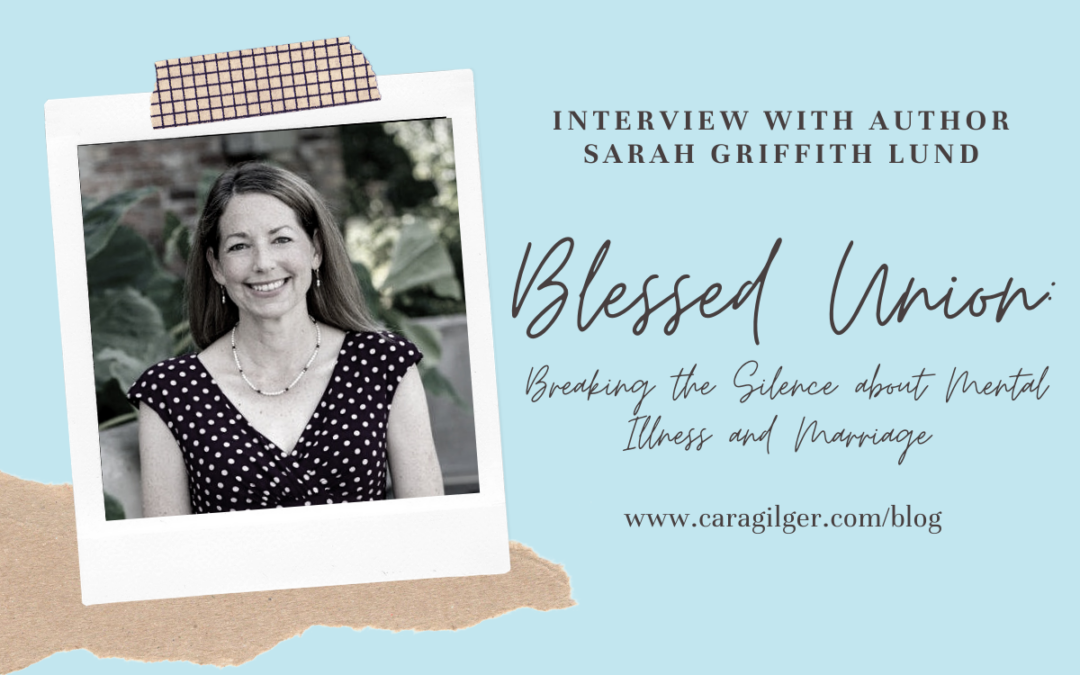As we settle into the end of winter blues and approach the start of our second year living with a pandemic, this month’s author interview feels incredibly timely. Many of my friends are talking about mental health, but not many of them feel comfortable talking about the impact of their pandemic mental health on their most intimate relationships or how the mental health of their closest relationships is impacting them.
In addition, I found author Sarah Griffith Lund’s book Blessed Union to be incredibly important resource for February, which is National Heart Health Awareness Month. One in every five children is born with a Congenital Heart Defect which means one in five parents is left to navigate the challenges and traumas of medical care and often surgery for their child. As a heart parent, we don’t often talk about the toll that stress takes on our mental health or the impact on our marriages.
I am honored to have the chance to talk with Sarah Griffith Lund about her newest release Blessed Union: Breaking the Silence Around Mental Illness and Marriage. A follow up book to her 2004 release Blessed are the Crazy: Breaking the Silence about Mental Illness, Family and Church, Blessed Union takes a deeper look at how to navigate and support our most intimate relationships at some of life’s most trying times.
Sarah’s twenty years of pastoral ministry has helped shape her passion for Mental Health Ministry. She currently serves as the first female senior minister at First Congregational United Church of Christ in Indianapolis and on National Staff for the United Church of Christ as the Minister for Disabilities and Mental Health Justice. What her bio won’t tell you is that Sarah is deeply gifted at holding tenderly the mental health journey of everyone she encounters in her work with thoughtfulness and care.

Cara: Mental Health and Marriage isn’t often a topic discussed openly, especially not in Christian circles. Tell me a little bit about why you chose to tackle a topic that often feels taboo.
Sarah: What life has taught me is that telling the true story about my life brings healing. This is what I practice doing in my therapy sessions: telling the truth. With my therapist I say out loud what I am afraid to admit to myself. Self-stigma keeps a lot of us from acknowledging the truth about how we experience mental health challenges. I know my therapist will not judge me and that together we can begin to create healing narratives about my life. Post-traumatic stress disorder (PTSD) is my body’s way of responding to the traumas in my life, and therapy is my way of healing from that trauma (along with lots of self-care practices like yoga, plant based diet, 8-10 hours of sleep).
I write about mental health as part of my healing journey. In the writing, I discover not only healing, but also blessings. The blessings come in the ways my writings create communities of compassionate conversation. I took on the topic of mental health and marriage because I was tired of feeling isolated because of the stigma and taboo, especially in Christian circles. From my research, I know that at least a quarter of all marriages are impacted by mental health challenges, so I know that I am not alone in these experiences. My hope is that my book Blessed Union will help us all know that we are not alone, and to encourage all of us to create communities of support and healing.
Cara: That balance between healing and blessing, community and connection is so beautiful. Our experience as heart parents who have been through so much medical trauma with our child is that sharing our story in community has been so healing.
One of the things I really loved about Blessed Union is the way you incorporated the voices of multiple couples, it feels accessible no matter what your story is around mental health and marriage. What made you decided to include other stories?
Sarah: I tell the stories of multiple couples and how mental illness impacts them to highlight the truth that every person with a brain can get sick. It doesn’t matter your age, culture, gender, education level, income, or marital status, because mental health challenges, like the common cold, can and do happen to most of us. There’s a wide spectrum of mental health with conditions ranging from mild depression and anxiety (the most commonly reported forms of mental illness) to addiction, to eating disorder, to bipolar disorder, to schizophrenia. Over the past several years, I’ve collected hundreds of stories from other couples and I began to realize in a profound way that it wasn’t just me and my marriage. I love that Blessed Union shows us in the multiple stories about different marriages that we are not alone. The power in hearing multiple stories and our collective story telling helps shatter the shame and stigma of mental illness.
Cara: We share a similar stream of the Christian tradition, but I am always surprised when I encounter Christians that are struggling with mental health who think they shouldn’t get help—that Christians should pray their mental illness away or “hand it over to God.” For the Christian couple who might have been raised with this perspective, how would you explain a more expansive understanding of mental health? And what tools would you recommend they add to their tool box to support mental health in their marriage?
Sarah: The most powerful teaching of the Christian faith is that God loves each one of us. For Christians struggling with their mental health, I encourage us to be guided by God’s love. I call this God’s Big Blessed Love.
Love desires for us to flourish and to thrive, to praise God with our whole being. For many of us with mental health challenges, flourishing, thriving and praising God can be hard to do when we are experiencing symptoms of mental health conditions that cause us to feel despair, hopeless, low self-esteem, irritated, worthless, and helpless. The key is to remember that we are created in God’s image and that we are not defined by how we feel in the moment or by our illness or diagnosis our worst symptoms. Yet, stigma keeps us from loving ourselves. As Christians, we can help to end stigma by learning how to love ourselves, especially when we are experiencing mental health challenges.
Because God wishes for our health and wholeness, and because Jesus teaches us to love our neighbors as ourselves, we love ourselves by taking care of our mental health. God gives us the tools we need through medical advances in brain science and through the talents of therapists, psychiatrists, and phycologists. An excellent tool for marriages is a free online mental health screening by Mental Health America that will provide guidance as to what resources may best help you along your healing journey. (https://screening.mhanational.org/screening-tools/)
Cara: The way your work insists that mental health isn’t solitary work but also the healing work of community is refreshing. There have been so many research-based articles about the impacts of the pandemic and its social isolation on mental health, so Blessed Union feels so timely. If couples are feeling the strain, where should they start?
Sarah: As the global pandemic enters its second year, we are all feeling it. Our mental health is going to be what gets us through this rough time. For couples feeling the strain, the stress, the endlessness of the pandemic, a good place to start is to get a group of friends (one or two other couples or more) and read Blessed Union together. I designed the book to be read in community, with discussion questions and prayers throughout the book. There’s even a journal tucked into the last dozen pages with prompts to help open up honest and real exploration about mental health.
The best place to start is wherever you are right now, getting honest with yourself first. How are you reallydoing? It’s okay to not be okay. Sometimes, especially for faithful Christians, the “Savior” complex covers up what’s really going on inside of us because we’ve gotten so used to saving everyone and everything around us. There’s extra pressure to rescue and save if we are also parenting. But we are living in a time where we can’t get through this alone. We are going to need the help of others. Being physically isolated from others for the past year is taking its toll. It is vitally important for us to find healthy ways to get emotional and mental health support from people who genuinely care. Telehealth therapy and couples counseling is a good option for safe and meaningful connection and mental healthcare.
Cara: One of the reasons I was so excited to read Blessed Union and to talk to you is because mental health has been a huge part of my journey as a partner and parent. A few years ago my daughter had open heart surgery. It was supposed to be a routine procedure with minimal risk, but there were complications and she ended up having two more unplanned surgeries in a matter of days. That’s traumatic as a parent, let alone trying to navigate that your partner might also be going through the same experience but processing it in very different ways. You also have the responsibility of helping this other small human process their own mental and emotional experience, it can feel like a lot.
So many heart parents have the strain of hospital stays, medical bills, doctors visits and the unknown looming in their relationship. How do you encourage couples to care for their mental health in the midst of a family medical crisis, especially when it involves the caregiving of a child?
Sarah: It’s important to remember that your feelings belong to you and are valid. A single event can impact two people in very different ways, as you describe in your marriage. It’s important to honor the diversity of ways of processing trauma and try not to judge what response is “correct” or “good.” Sometimes we judge ourselves or shame ourselves, thinking our emotional response is not the “correct” one. Or we can suppress our feelings or we can feel numb, all of these are valid ways to feel. I highly recommend having both an individual therapist and a couple’s therapist. In your individual therapy, you can share and process thoughts and feelings about the marriage and your partner in a safe space. These conversations can help you know what to work on in couple’s counseling. This is an investment of time and money, and it is way less expensive than divorce.
Whenever there is a child involved, remember that children have a story they are telling themselves about whatever it is that is going on. Most of the time the stories our children tell themselves are going to be centered around themselves as the primary cause of whatever problem is at hand. Be ready to explain to a child in very simple terms the following: (1) we are getting the best help available to us, (2) the problem is bad and we are working on making things better, (3) this is not your fault, (4) this is part of what it means to be human, (5) you can ask any questions you want, and (6) we love you no matter what.
Cara: What are some small tips you can give parents going through difficult experience, like a child’s open heart surgery or long term hospital stay, to support their mental health and marriage?
- Acknowledge that this experience will not last forever. There was a *before* and there will be an *after* and you will survive.
- It’s understandable to get tunnel vision and be fully focused on the difficult experience at hand. This type of hyper awareness is mentally exhausting. Take mini-breaks to think about something else and do something else, even if it seems silly or unimportant. Crossword puzzles, jigsaw puzzles, going for walks, playing with the dog, watching Netflix, are all ways to give your mind something else to think about.
- Our bodies carry around our emotional stress and trauma. We forget to breathe, we forget to stretch, we can forget to eat or how to sleep. Being extra intentional about taking slow, deep breaths, eating healthy food, drinking lots of water, taking showers, and relaxing so we can sleep are all important for mental wellness.
- Stress can be released through safe, gentle, and caring touch. Try to hold or hug your partner for at least 20 seconds. (I count backwards from 20 in my head when I hug my partner.) This extended amount of affection tells our brains that we are safe and helps to release stress, replacing the stress with positive feelings.
Cara: What is one thing you wish people knew about mental health and marriage?
Sarah: Even when things are bad, they can get better. I think about Psalm 23 and the valley of the shadow of death because sometimes it can feel like we are in the valley in our marriages. Scripture promises that God is with us to guide us and comfort us and to lead us out of the valley. I find great encouragement and hope in the promise that God’s Big Blessed Love is with us always. I believe with all my heart that healing and recovery are possible.
Cara: There are so many great resources for mental health, what are some of the ones you recommend frequently?
Mental Health America (www.mhanational.org)
National Alliance for Mental Illness (www.nami.org)
Pathways to Promise (www.pathways2promise.org)
United Church of Christ Mental Network (www.mhn-ucc.org)
Cara: Where can people find you if they want to connect or learn more about your ministry?
Sarah: You can buy my book anywhere books are sold! If you’d like a personally signed copy of my book, check out my online bookstore. You can also find me on Facebook and Twitter and I have a Newsletter where I talk about mental health so that’s a great place to get quick, digestible resources delivered right to your inbox.
My most favorite conversation about mental health ever was this special event, “Real Talk About Real Marriage” with my friends and mental health experts. Check out–it makes a great date night and conversation starter.



Recent Comments